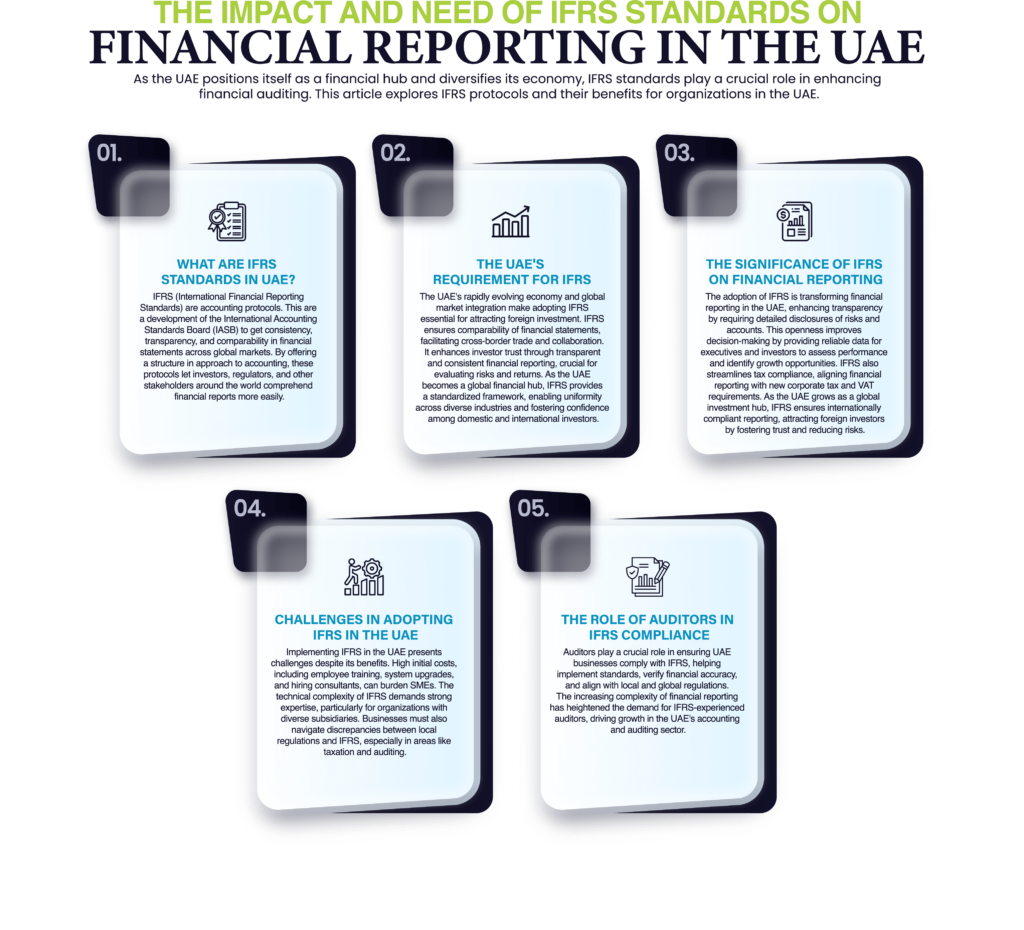The Impact and Need of IFRS Standards on Financial Reporting in the UAE
By positioning itself as a financial atom, the UAE is attracting investors. Important financial auditing is becoming more and more important as the economy diversifies.
One important factor in this change is the implementation of International Financial Reporting Standards (IFRS) or simply IFRS Standards
This article discusses IFRS protocols on financial auditing in the UAE. It also talks about how these protocols benefit organizations.
What Are IFRS Standards In UAE?
IFRS (International Financial Reporting Standards) are accounting protocols. This are a development of the International Accounting Standards Board (IASB) to get consistency, transparency, and comparability in financial statements across global markets. By offering a structure in approach to accounting, these protocols let investors, regulators, and other stakeholders around the world comprehend financial reports more easily.
The UAE's Requirement for IFRS
Comparability and Global Integration
Businesses in the UAE operate both domestically and abroad, creating a very dynamic commercial environment. Businesses in the UAE can create financial statements that are easily comparable to those of enterprises throughout the world by adopting IFRS standards, which makes cross-border collaborations, investments, and trade easier. When making investment selections, international investors need to be able to evaluate financial performance across several jurisdictions.
Increasing Investor Trust
In a market that is competitive and changing quickly, companies need to show that their financial transactions are highly transparent. By guaranteeing that businesses use a consistent approach to financial reporting, IFRS contributes to the growth of investor confidence. Attracting both domestic and foreign investors who depend on accurate and trustworthy financial accounts to evaluate the risk and profitability of their investments depends heavily on this confidence.
Standardization and Uniformity
The Significance of IFRS on Financial Reporting
Improvement In Finance Openness
Improved Business Decision-Making
Taxation And Compliance
Using IFRS helps companies to better manage their tax analysis duties in the United Arab Emirates. There the tax situation has seen a change due to the addition of corporate tax and VAT.
To assure more accurate tax reporting and compliance to regional laws, IFRS offers comprehensive criteria for identifying and quantifying income, costs, and liabilities.
Attracting Hefty Foreign Investment
Because of its geographical location, modern infrastructure, and tax breaks, the United Arab Emirates is growing as a lucrative destination for global investments.
The UAE must make sure that companies deliver globally compliant financial reporting if it is to keep this growth. In order to bring in investors who depend on globally financial statements to assess the risk of their investments, that’s why IFRS adherence is non-negligible

Challenges in Adopting IFRS in the UAE
Implementation Cost
Standards' Technicalities
Alignment of Regulations
The Role of Auditors in IFRS Compliance
In order to make sure that businesses in the UAE adhere to IFRS requirements, auditors are important. Audit firms assist companies in analyzing how to implement IFRS. This also confirmis the correctness of financial accounts, and guaranteeing adherence to pertinent national and international laws.
The need for qualified auditors with knowledge of IFRS has increased in the UAE due to the growing complexity of financial reporting, which has aided in the growth of the accounting and auditing industry as a whole.
Conclusion
Businesses in the United Arab Emirates must implement IFRS standards in order to stay competitive, and in line with global best practices. By increasing investor confidence, facilitating worldwide comparison, and improving financial transparency the UAE’s stands as a financial center see great improvement by IFRS. Despite challenges, IFRS compliance is important for companies who want to sustain in a global economy. That’s because the long-term benefits exceed the upfront expenses.
IFRS in financial reporting services will only increase as the UAE further integrates with the worldwide economy. This will offer a strong basis for long-term economic growth in both domestic and foreign investment.
MHR Chartered Accountants can help you launch your company. Our knowledgeable staff provides tax and advising assistance in addition to full accounting services in Dubai, guaranteeing a solid financial base and assisting you in navigating the regulatory environment of the United Arab Emirates for prosperous expansion.













